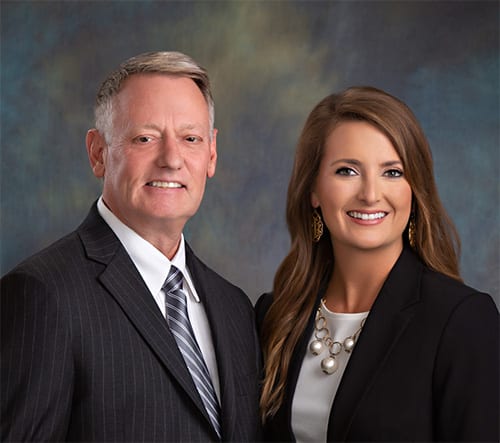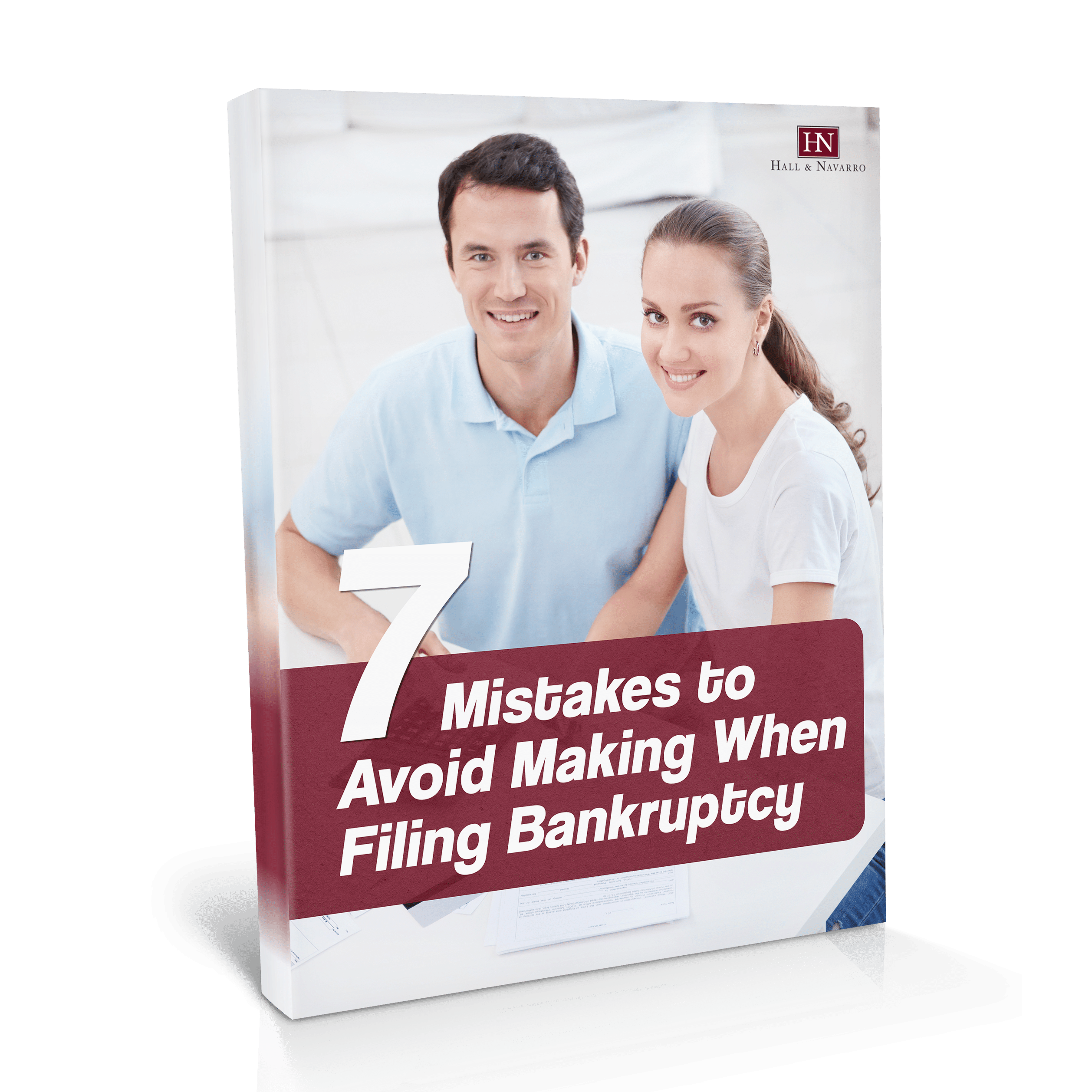Chapter 11 Bankruptcy
Georgia Chapter 11 Bankruptcy Lawyers
Breathe Easy.
We’re With You.
Are you feeling overwhelmed because your business is struggling financially? Debt in business can make life very stressful. Our Georgia Chapter 11 bankruptcy lawyers want to help you make the transition from this life full of stress to a brighter future with fewer worries.
Let our family handle your family’s needs. It’s time to end the collection calls and past-due letters. Call the Georgia bankruptcy lawyers at Hall & Navarro today to get started.

More info on ch. 11 Bankruptcy:
Watch this video.
Considering bankruptcy?
Download our free guide.
There are 7 mistakes you should avoid when filing bankruptcy.

Top Rated Family Lawyers in Georgia
Over 100 5-star reviews on google









How is Hall & Navarro different?
Prepared to Win
No matter what, we approach every case prepared to win. This has been our driving force from day one, and still carries us forward today.
Breadth of Experience
With more than 75 years of combined experience in a variety of practice areas, we are frontrunners of law in Southeast Georgia.
Fearless representation
We put everything forward, and take nothing back. We are a united front, rallying behind and in front of every client.
Defining Chapter 11 Bankruptcy
Chapter 11 bankruptcy is a way to reorganize your debts and assets. You will be looking to gain a fresh start with Chapter 11. It can be very complex and you should absolutely precede with the help of one of our Georgia chapter 11 bankruptcy lawyers.
Likely the filing of Chapter 11 is going to allow for a business to continue operating. Historically, there have been several large businesses that have continued to operate during a Chapter 11 bankruptcy such as K-mart, United Airlines, General Motors and so on. However, Chapter 11 is not just for huge businesses. It can help any size business. It is very rare to see an individual person file for Chapter 11 bankruptcy but it is not unheard of when someone has a lot of debt but doesn’t qualify for Chapter 7 or 13.
Things to Consider with Chapter 11 Bankruptcy
When bankruptcy is being considered, note that this must benefit the creditors who have loaned money.
Whether you are filing Chapter 11 bankruptcy for your business or as an individual, you as the debtor are going to be able to propose a plan to reorganize your debt first. You may show that you will downsize some of your business, which would reduce costs and so on. It also may include liquidating some of your assets in order to pay back some of the debt to your creditors. The court may accept the plan as you made it, if they see it playing out well. If not, it will be made for you.
Schedule your consultation.
Speak with one of our dedicated team members by filling out the form below.
More Chapter 11 Info
What the debtor who can file Chapter 11 Bankruptcy Should Know
There are three types of Chapter 11 bankruptcies presently. There is the normal Chapter 11; there is the small business case; and as of February 19, 2020, a subchapter V case. Each Chapter 11 case has different requirements and procedures. All are for the rehabilitation of a business that is having cash flow problems.
A subchapter V Chapter 11 is a voluntary election by the debtor. This case resembles a chapter 12 or 13 case is some ways. It provides for a trustee to generally oversee the business but leaves the debtor in possession of the assets and control of the business. In some cases, the trustee may make distributions to creditors. The debt limitation presently is $7,500,000 under the CARES Act. Normally the debt limitation is $2,725,625. This bankruptcy attempts to expedite bankruptcy and reduce administrative expenses. Debtors must file plans of reorganization within 90 days of the bankruptcy filing. There is no disclosure statement to prepare and pay for. No administrative fees are paid to the United States Trustee. Most importantly for small businesses there is no requirement the principals of the debtor have to fund the purchase of shares in the business. In other words, the subchapter V eliminates the “absolute priority” rule (owners can retain their equity in a Subchapter V small business over the objection of a class of unsecured creditors, without paying those creditors in full). A more complete discussion of subchapter V cases is covered below.
The same debt limitation is applicable in a “small business case”. If the debtor business has debt less than $2,725,625 it is deemed a small business case if no election is made to be a subchapter V case. A small business case (‘SBC”) has additional filing requirements such as financial statements within seven days of filing. Only the debtor may file a plan in a SBC within 180 days of the bankruptcy but must file a plan within 300 days or the case will be dismissed or converted to chapter 7. The disclosure statement may be conditionally approved without a separate hearing as is required in a normal chapter 11.
As would be expected most chapter 11’s will fall into the two above categories. If the case is a single real estate asset case, neither SBC nor subchapter V is available. The remaining option is a normal chapter 11 case. In this chapter 11 the debtor has 120 days in which you, as the debtor, can file your Chapter 11 bankruptcy. It is an exclusive right in which you can file your plan to repay or reorganize your debt to the creditors. The court can grant an extension or even reduce this time, if it deems fit to do so. The amount of time it can extend it, however, is capped at 18 months. As soon as this time limit has ended, which could be somewhere between 120 days or 18 months, the creditors may file a competing plan if they choose to do so..
All bankruptcies require:
- To confirm any plan of reorganization, the debtor must satisfy the so-called Best Interest Test by providing creditors at least as much as they would receive if the debtor were liquidated and not reorganized.
- Secured creditors retain the right to make an election under section 1111(b)(2) of the Bankruptcy Code to have the entire amount of their claims remain secured by their collateral, while receiving altered payment terms under the Plan. The effect of a section 1111(b)(2) election is to secure for the secured creditor any post-confirmation increase in the value of its collateral effectively upon its sale, at the expense of receiving payment on the unsecured deficiency part of its claim under the debtor’s confirmed plan of reorganization.
- Secured creditors retain their rights to have their collateral “adequately protected” against diminution in value or be granted relief from the Bankruptcy Code’s automatic stay to realize on their collateral.
- To assume executory contracts, i.e., leases debtors must still cure defaults and, where required, provide adequate assurance of future performance.
Do note that Chapter 11 could continue to go on for several years. The ones who have the power to make sure that the case is resolved in a timely manner are the court, the trustee of the case, and the committee working on the case.
What happens after a Chapter 11 Bankruptcy?
With a Chapter 11 bankruptcy, you have a lot of moving parts. You have a business that you’re running. You have payroll that has to be made. You have accounts receivables that have to be collected, so you continue to run your business as you did before. You have separate accounts now set up for the debtor in possession: a tax account, an operating account, and a payroll account. But you also have issues concerning the collection, for instance, of accounts receivable. Many times, accounts receivables might be placed to your creditor. Obviously, to collect those receivables and to use those in your business would be very important, so you have to obtain the creditor’s permission to use those monies in your business, or you have to obtain court approval.
A Chapter 11 bankruptcy is a complicated bankruptcy in which you really need an attorney who has done this kind of work before, who knows what kind of motions to file, what kind of approvals to obtain, and the trustee. For a successful Chapter 11 bankruptcy to occur, you need the trustee, the court, the bankruptcy judge in the court, and the creditors to all work together. That’s where having an attorney can be very beneficial.
Why do individuals or companies choose to file a Chapter 11 Bankruptcy?
Many times, people ask us why a company would file a Chapter 11 bankruptcy in Georgia. There are basically two reasons to file a Chapter 11 bankruptcy.
One is to obtain an orderly liquidation of assets, for instance, if the company is not profitable. Then a Chapter 11 might work.
The other reason and primary reason that we file Chapter 11s is that the business is truly profitable but just has a cash flow crunch. This was more common for some businesses during COVID-19. Sales had fallen down, yet employee salaries still needed to be paid, but yet, in the long term, the business could be profitable.
Also, with a Chapter 11, you can have up to four and six months to actually file a plan to start repayment to your creditors. This gives you a breathing spell in which the court allows you time to reorganize your debts, assets, and business so that it can have a profitable future and have a lifespan that it would not have otherwise because the creditors might foreclose and take your assets away.
How do I continue paying my employees during a Chapter 11?
One of the first questions that we get regarding a Chapter 11 bankruptcy in Georgia is how to continue to pay your employees. Any Chapter 11 requires the setting up of three different accounts. One is a tax account, one is a payroll account, and one is an operating account. Those accounts must be set up in order to pay the employees after the filing of a bankruptcy. This is the only way you can disburse those monies to your employees.
